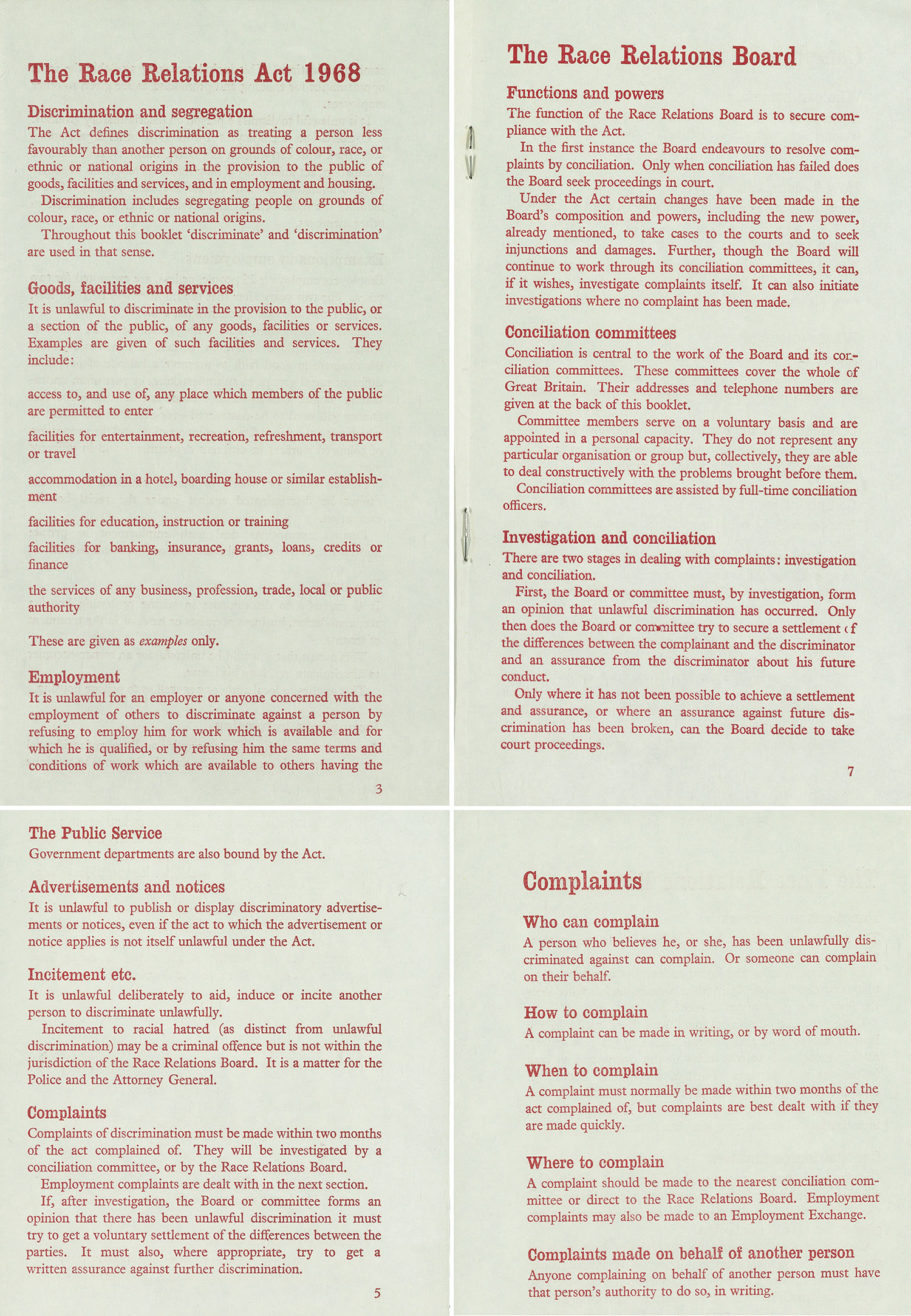
Extracts from a booklet explaining the terms of Race Relations Act and Board set up in 1968. Catalogue ref: LAB 44/286
- According to the Race Relations Act what is meant by discrimination and segregation?
- How did the Race Relations Board work and deal with complaints?
- Why do you think this booklet was produced?
Transcript
The Race Relations Act 1968
Discrimination and segregation
The Act defines discrimination as treating a person less favourably than another person on grounds of colour, race or ethnic or national origins in the provision to the public of goods, facilities and services, and in employment and housing.
Discrimination includes segregating people on grounds of colour, race, or ethnic or national origins.
Throughout this booklet ‘discriminate’ and ‘discrimination’ are used in that sense.
Goods, facilities and services
It is unlawful to discriminate in the provision to the public, or a section of the public, of any goods, facilities or services. Examples are given of such facilities and services. They include:
Access to, and use of any place which members of the public are permitted to enter
Facilities for entertainment, recreation, refreshment, transport or travel
Accommodation in a hotel, boarding house or similar establishment
Facilities for education, instruction or training
Facilities for banking, insurance, grants, loans, credits or finance
The services of any business, profession, trade, local or public authority
These are given as examples only.
Employment
It is unlawful for an employer or anyone concerned with employment of others to discriminate against a person by refusing to employ him for work which is available and for which he is qualified, or by refusing him the same terms and conditions of work which are available to others having the …
…
The Public Service
Government Departments are also bound by the Act.
Advertisements and notices
It is unlawful to publish or display discriminatory advertisements or notices, even if the act to which the advertisement or notice applies is not itself unlawful under the Act.
Incitement
It is unlawful deliberately to aid, induce or incite another person to discriminate unlawfully.
Incitement to racial hatred (as distinct from unlaw discrimination) may be a criminal offence but is not within the jurisdiction of the Race Relations Board. It is a matter for the Police and the Attorney General.
Complaints
Complaints of discrimination must be made within two months of the act complained of. They will be investigated by a conciliation committee, or by the Race Relations Board.
Employment complaints are dealt with in the next section.
If, after investigation, the Board or committee forms an opinion that there has been unlawful discrimination it must try to get a voluntary settlement of the differences between the parties. It must also, where appropriate, try to get a written assurance against further discrimination.
…
The Race Relations Board
Functions and powers
The function of the Race relations Board is to secure compliance with the Act.
In the first instance the Board endeavours to resolve complaints by conciliation. Only when conciliation as failed does the board seek proceedings in court.
Under the Act certain changes have been made in the Board’s composition and powers, including the new power, already mentioned, to take cases to the courts and to seek injunctions and damages. Further, though the Board will continue to work through its conciliation committees, it can, if it wishes, investigate complaints itself. It can also initiate investigate where no complaint has been made.
Conciliation committees
Conciliation is central to the work of the Board and its conciliation committees. These committees cover the whole of Great Britain. Their addresses and telephone numbers are given are given at the back of this booklet. Committee members serve on a voluntary basis and are not appointed in a personal capacity. They do not represent any particular organisation or group but, collectively, they are able to deal constructively with the problems brought before them. Conciliation committees are assisted by full-time conciliation officers.
Investigation and conciliation
There are two stages in dealing with complaints: investigation and conciliation.
First, the Board or committee must, by investigation, form an opinion that unlawful discrimination has occurred. Only then does the Board or committee try to secure a settlement of the differences between the complainant and the discriminator and an assurance from the discriminator about his future conduct. Only where it has not been possible to achieve a settlement and assurance, or where an assurance against future discrimination has been broken, can the Board decide to take court proceedings.
…
Complaints
Who can complain
A person who believes, he, or she, has been unlawfully discriminated against can complain. Or someone can complain on their behalf.
How to complain
A complaint can be made in writing or by word of mouth.
When to complain
A complaint must normally be made within two months of the act complained of, but complaints are best dealt with if they are made quickly.
Where to complain
A complaint should be made to the nearest conciliation committee or direct to the Race Relations Board. Employment complaints may also be made to an Employment Exchange.
Complaints made on behalf of another person.
Anyone complaining on behalf of another person must have that person’s authority to do so, in writing.
…
